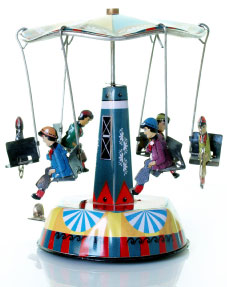


"The Medication Merry-Go-Round"
by Siegfried Othmer, Ph.D.
The current issue of Science (14 Mar 2003, #266, P1646-9) discusses the current state of research on psychiatric medications for children.
The discussion starts with an anecdote of a five-year-old child entering the first stages of Bipolar Disorder: "...after two years of special diets, sticker rewards, therapy, and inconclusive diagnoses, John began what his mother calls "the medication merry-go-round." Over the past 6 years, doctors have prescribed 20 different medications for John...
Some of the drugs have soothed [his] symptoms; others have not."
The story makes the following points:
- "Most drugs prescribed to children...have not been tested in young children."
- "According to recent estimates, 3 million to 4 million American children under 18 take psychiatric drugs..."
- According to the FDA, some 70-80% of all drugs prescribed to children (including medications for mental disorders) are being used "off-label," i.e. for indications for which research has not been done.
- Among HMO child patients, use of psychiatric meds tripled in the decade up to 1996.
- Some 6% of all such children are on psychiatric medications. (Since this is an average up to age 18, the number is much higher for some age groups such as the 7-9- year cohort where stimulant use peaks. [S.Othmer])
- The fastest-growing group is the youngest children, age 2-4, where usage has tripled in four years between 1991 and 1995.
Scientists are concerned:
- "In the absence of strong science, I think we are taking some risks."
James Leckman, Child Psychiatrist, Yale University. - "We don't know if the right kids are getting the right meds."
Michael Jellinek, Chief of Child Psychiatry, Mass General Hospital. - Researchers desperately need data on long-term drug risks and medication combinations. "Until we have that data, we're conducting an experiment
with the lives of children."
John March, Child Psychiatrist, Duke University. - "This research [SSRIs for OCD] suggests that after just 12 weeks of medication, the size of the thalamus decreases in size significantly. If you treat someone whose thalamus is just fine, that could be a problem."
David Rosenberg, Child Psychiatrist, Wayne State University. - Considering data on growth-stunting effects of SSRIs in children*: "We don't know if this is a temporary effect or will become more accentuated in time...That's one of the problems with the use of drugs in kids. We don't know the long-term risks."
Thomas Laughren, Head of FDA Team for Evaluation of Psychiatric Drugs.
The questions that have not been answered include the following:
- How do mind medications affect growing children?
- What happens when children take them for years?
- How does dosage differ in children from adults?
- What are the age dependences of dosage?
- What drug interaction effects need to be considered?
Commentary:
Nowhere in the article is there a hint that there may be a possibility of a non-drug alternative to address childhood mental health issues, traditional therapies excepted. With regard to the latter, Rosenberg suggests that "medication and therapy appear to act on different neural circuits." His data come from SSRI intervention with OCD, and focuses on the thalamus, which shrinks with successful SSRI treatment but not with successful psychotherapy. This is in contrast to the earlier findings of Lewis Baxter at UCLA that found comparable functional changes in the caudate with both medication and successful psychotherapy for OCD, which findings suggested a common mechanism.
Despite the concerns, it is clear that the scientists quoted here still constitute an enthusiastic cheering section for intervention with psychiatric medications in young children. There was no mention in the article of the more severe risks, such as the risk of death that may attend drug combinations such as Ritalin and Clonidine, or the risk of liver damage that may attend long-term use of some anti-convulsants. The agenda can be discerned: Child psychiatrists are concerned enough to make the case for what they do, i.e. more research, but not enough to indict the system of which they are an integral part.
* 1.1 cm reduction in height gain and 1.1 kilos reduction in weight gain in 19 weeks of SSRI administration. That's a lot. Did the kids actually shrink?
Self-Regulation Remedy? »
You Must Be Kidding. »
by Siegfried Othmer, Ph.D. »
by Siegfried Othmer, Ph.D. »
by Mark Steinberg, Ph.D.
and Siegfried Othmer, Ph.D. »